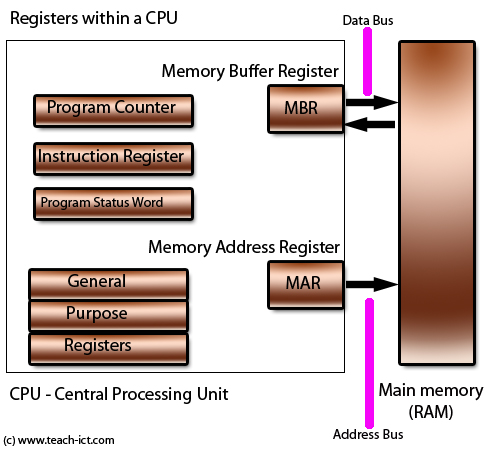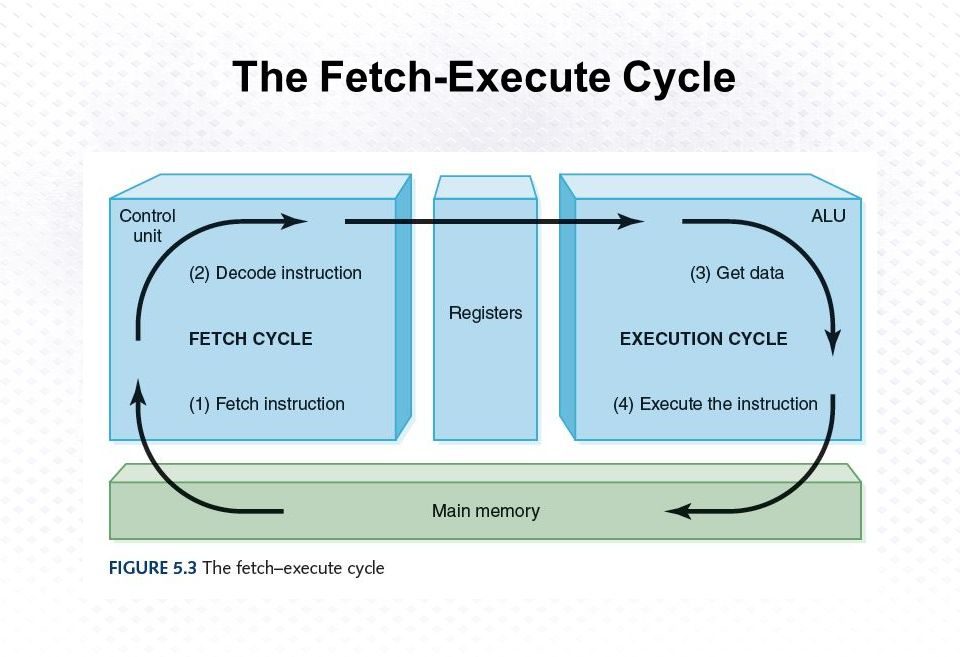Back to: DATA PROCESSING SS 2
Welcome to class!
In today’s class, we will be talking about computer data conversion. Enjoy the class!
Computer Data Conversion
Register
This is a special high-speed storage area within the CPU. All data must be represented in a register before it can be processed, for example, if two numbers are to be multiplied, both numbers must be in registers, and the result must be placed in a register. (The register can contain the address of a memory location where data is stored rather than the actual data itself.)

Address
An address is used to reference a storage location in the main memory. You can think of computer memory as an array of storage boxes, each of them has an address (a unique number) assigned to it.
Bus
A collection of wires through which data is transmitted from one part of a computer to another. You can think of a bus as a highway on which data travels within a computer. When used about personal computers, the term bus usually refers to the internal bus. This is a bus that connects all the internal computer components to the CPU and main memory
Types of registers
The types of registers are Memory data register (MDR) and Current instruction Register (CIR)
The types of registers can be explained better by their functions.
MDR:
- The memory data register is used to hold data or the memory address that contains either the next piece of data or an instruction that is to be used.
- The memory data register acts as a buffer and holds data that is transferred from the memory to the processor.
- The memory data register is used whenever data is being transferred between the central processing unit and main memory.
CIR:
- Current instruction register is the register, usually in the control unit, that contains the instruction that is being executed by the CPU.
- The CIR stores the instruction currently being executed. In simple processors, each instruction to be executed is loaded into the instruction register which holds it while it is decoded, prepared and ultimately executed.
Differences between Register and Main Memory
Factor considered: storage, speed, storage capacity and relative cost.
| Storage devices | Speed | Storage capacity | Relative cost |
| Register | Fast | Very low | Very high |
| Main memory | Very fast | Low and moderate | High speed |
Data-Fetch-Execute cycle
Fetch execute cycle is the very basic way a computer works. All commands are executed through the running of this cycle. The cycle itself has very few commands, however, when linked up together it is possible to create a large program or even an operating system.
The cycle contains 3 main parts
- Fetch the instruction
- Decode the instruction
- Execute the instruction

Operating procedure of computer data processing
Data processing consists of all activities which are necessary to transform data into information.
Computer data processing is grouped under five basic categories as shown below;

The following are factors affecting the Speed of Data Transfer
- Bus Speed
- Bus Width
- Medium of Storage
- Data transfer medium
General evaluation
- Define the following;
- Register
- Bus
- Address
- List and explain types of register
Weekend assignment
Objective
- Computer data processing is grouped into the following EXCEPT one. (A) Conversion (B) Manipulation (C) Register
- The following are types of register EXCEPT ___________ (A) CMR (B) CIR (D) MDR
- ___________ register acts as a buffer and holds data that is transferred from the memory to the processor. (A) MDR (B) CIR (C.) CPU
- All data must be represented in a register before it can be processed. TRUE / FALSE
Theory
- State two differences between register and main memory.
- List and explain the factors affecting the speed of data transfer.
In our next class, we will be talking about the Concept of Computer Files. We hope you enjoyed the class.
Should you have any further question, feel free to ask in the comment section below and trust us to respond as soon as possible.

PLEASE CAN YOU GIVE ME A BRIEF CONCLUSION ON THE TOPIC DATA CONVERSION
David
Registers are actually faster than the main memory not the other way around. I think there is a mistake it the comparison between Registers and Main memory